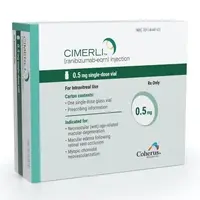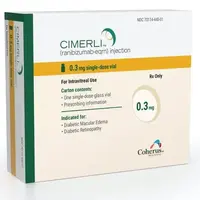Cimerli is used to treat neovascular (wet) age-related macular degeneration (AMD), which occurs when abnormal blood vessels grow under the macula and retina in the eye.
Cimerli is used to treat macular edema (swelling) caused by diabetes or by a blockage in the blood vessels. it is also used to treat diabetic retinopathy, the most common cause of vision loss in people with diabetes.
Cimerli is also used to treat myopic choroidal neovascularization (mCNV), a complication of severe near-sightedness that can lead to blindness.
Cimerli may also be used for purposes not listed in this medication guide.
Warnings
You should not receive Cimerli if you are allergic to ranibizumab, or if you have any type of infection in or around your eyes.
Call your doctor at once if you have sudden vision problems, eye pain or redness, or if your eyes are more sensitive to light.
The timing of your monthly injections is very important for this medicine to be effective.
Related/similar drugs
Vabysmo, dexamethasone ophthalmic, triamcinolone ophthalmic, Eylea, Lucentis, aflibercept ophthalmic, fluocinolone ophthalmic
Before taking this medicine
You should not receive Cimerli if you are allergic to ranibizumab, or if you have any type of infection in or around your eyes.
To make sure this medicine is safe for you, tell your doctor if you have:
It is not known whether this medicine will harm an unborn baby. Tell your doctor if you are pregnant or plan to become pregnant.
It is not known whether Cimerli passes into breast milk or if it could affect the nursing baby. Tell your doctor if you are breast-feeding.





